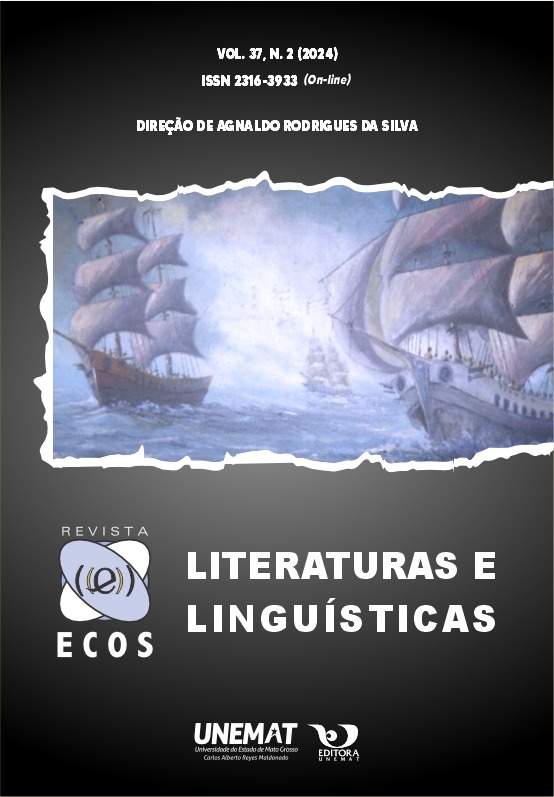VERDADE SEMÂNTICA E ENGANO PRAGMÁTICO: PERSPECTIVAS LINGUÍSTICAS SOBRE DESINFORMAÇÃO/SEMANTIC TRUTH AND PRAGMATIC DECEPTION: LINGUISTIC PERSPECTIVES ON DISINFORMATION
DOI:
https://doi.org/10.30681/ecos.v37i02.12466Palavras-chave:
Semântica. Pragmática. Desinformação. Vigilância epistêmica. Evolução da linguagem.Resumo
A disseminação da desinformação representa uma grave ameaça às sociedades democráticas. Este artigo aborda como as propriedades da cognição e da comunicação humanas são exploradas estrategicamente pela desinformação. Do ponto de vista da cognição, abordaremos vertentes teóricas que fundamentam a evolução da linguagem, tanto racionalista (CHOMSKY, 2010, 2013, 2016), quanto funcionalista (REBOUL, 2017), derivando na abordagem da vigilância epistêmica (SPERBER et al., 2010; SPERBER; MERCIER, 2017). A análise resulta numa concepção de cognição que opera na comunicação com vulnerabilidades ao uso dominador em ambientes de comunicação em massa, burlando a vigilância epistêmica. Para sustentar essa hipótese, do ponto de vista da comunicação, exploraremos fenômenos, tanto retórico-pragmáticos (PERELMAN; OLBRECHTS-TYTECA, 1996) quanto semântico-gramaticais (CARLSON, 2011) a fim de fundamentar a materialidade linguística da manipulação do discurso de desinformação.
Downloads
Referências
BAKHTIN, Mikhail. Estetica da Criação Verbal. São Paulo: Martins Fontes, 1992.
BOYD, Robert; RICHERSON, Peter J. Culture and the evolution of human cooperation. Philosophical Transactions of the Royal Society, [S. l.], v. 364, p. 3281–3288, 2009.
CARLSON, Gregory. Genericity. In: VON, Klaus Heusinger; MAIENBORN, Claudia; PORTNER, Paul (org.). Semantics: An International Handbook of Natural Language Meaning. Berlin, Boston: De Gruyter Mouton, 2011. p. 1153–1185.
CHOMSKY, Noam. Some simple evo devo theses: How true might they be for language? In: LARSON, Richard K.; DÉPREZ, Viviane; YAMAKIDO, Hiroko (org.). The Evolution of Human Language: Biolinguistic Perspectives. Cambridge: Cambridge University Press, 2010. p. 45–62.
CHOMSKY, Noam. Problems of projection. Lingua, [S. l.], v. 130, p. 33–49, 2013.
CHOMSKY, Noam. What kind of creatures are we? New York: Columbia University Press, 2016.
FAZIO, Lisa K.; RAND, David G.; PENNYCOOK, Gordon. Repetition increases perceived truth equally for plausible and implausible statements. Psychonomic Bulletin and Review, [S. l.], v. 26, n. 5, p. 1705–1710, 2019.
FIORIN, José Luiz. Argumentação. São Paulo: Contexto, 2015.
FITCH, W. Tecumseh. Empirical approaches to the study of language evolution. Psychonomic Bulletin and Review, [S. l.], v. 24, n. 1, p. 3–33, 2017.
GHOSSAINY, Maliki E.; AL-SHAWAF, Laith; WOOLLEY, Jacqueline D. Epistemic Vigilance in Early Ontogeny: Children’s Use of Nonverbal Behavior to Detect Deception. Evolutionary Psychology, [S. l.], v. 19, n. 1, p. 1–11, 2021.
MARTEL, Cameron; PENNYCOOK, Gordon; RAND, David G. Reliance on emotion promotes belief in fake news. Cognitive Research. Principles and Implications, [S. l.], v. 5, n. 1, p. 1–44, 2020.
NÓBREGA, Vitor A. O problema de Wallace-Darwin. In: OTHERO, Gabriel de Ávila; KENEDY, Eduardo (org.). Chomsky: a reinvenção da linguística. São Paulo: Contexto, 2019. p. 202–220.
NYHAN, Brendan; REIFLER, Jason. When corrections fail: The persistence of political misperceptions. Political Behavior, [S. l.], v. 32, n. 2, p. 303–330, 2010.
PENNYCOOK, Gordon; CANNON, Tyrone D.; RAND, David G. Prior exposure increases perceived accuracy of fake news. Journal of Experimental Psychology. General, [S. l.], v. 147, n. 12, p. 1865–1880, 2018.
PERELMAN, Chaïm; OLBRECHTS-TYTECA, Lucie. Tratado da argumentação - a nova retórica. São Paulo: Martins Fontes, 1996.
REBOUL, Anne. Truthfully Misleading: Truth, Informativity, and Manipulation in Linguistic Communication. Frontiers in Communication, [S. l.], v. 6, n. April, p. 1–8, 2021.
REBOUL, Anne C. Cognition and Communication in the Evolution of Language. 2nd. ed. Oxford: Oxford University Press, 2017.
REN, Zhiying; DIMANT, Eugen; SCHWEITZER, Maurice. Beyond belief: how social engagement motives influence the spread of conspiracy theories. Journal of Experimental Social Psychology, [S. l.], 2023.
SHIEBER, Joseph. An Idle and Most False Imposition : Truth-Seeking vs . Status-Seeking and the Failure of Epistemic Vigilance. Philosophic Exchange, [S. l.], p. 1–32, 2023.
SPERBER, Dan; CLÉMENT, Fabrice; HEINTZ, Christophe; MASCARO, Olivier; MERCIER, Hugo; ORIGGI, Gloria; WILSON, Deirdre. Epistemic Vigilance. Mind & Language, [S. l.], v. 25, n. 4, p. 359–393, 2010.
SPERBER, Dan; MERCIER, Hugo. The Enigma of Reason. [s.l.] : Penguin Books, 2017.
VOSOUGHI, Soroush; DEB, Roy; ARAL, Sinan; ROY, Deb; ARAL, Sinan; DEB, Roy; ARAL, Sinan; ROY, Deb; ARAL, Sinan. The spread of true and false news online. Science, [S. l.], v. 359, n. 6380, p. 1146–1151, 2018.
WALTON, Douglas. Ad hominem arguments. First ed. Alabama: University of Alabama Press, 2009. DOI: 10.1017/cbo9780511806544.006.

